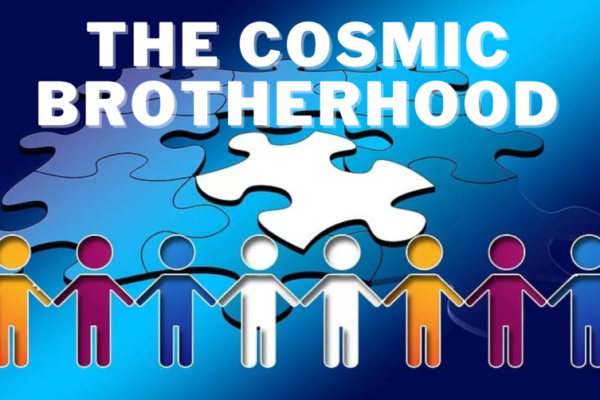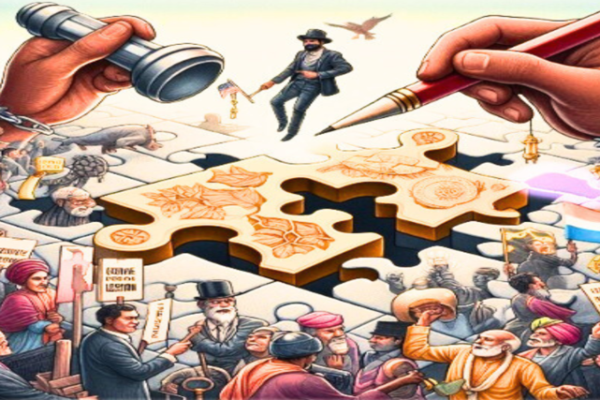By Dr. Hans-Joachim Rudolph, MRI
A major Banksy retrospective is currently on in Berlin, and I particularly liked one piece of graffiti: It shows a woman with a shopping cart, just as you see them in all the supermarkets. But instead of browsing selectively through the shelves, she falls headfirst from the sky.

Banksy: Consumption
The picture reminds me of the so-called Angel’s Fall! However, it depicts this mythological event in a secularized form: In Judaism as well as in Christianity and Islam, it is the archangels (Samael, Lucifer and Asasel respectively) who have to leave heaven and fall to earth. The most famous illustration is possibly by Gustave Doré depicting the fall of the archangel Lucifer from heaven.

Gustave Doré: The Fall of Lucifer
But why this religious reference? Christianity is playing an increasingly minor role in our society, and has been replaced by a general nihilism. Accordingly, Friedrich Nietzsche posed the question in the third book of his Fröhliche Wissenschaft: Are we not constantly falling? And backwards, sideways, forwards, to all sides? Is there still a top and a bottom? Are we not wandering through an infinite nothingness? Such nothingness is, however, hardly bearable for us; the absence of God leaves a gap that cries to be filled by substitutes.
In this context, Karl Marx introduced fetishes, which he didn’t associate with sexual perversions, but with animistic religions. In his main work ‘The Capital’, he used the term to describe phenomena of political economy in such a way that under capitalism, commodities, the cultural product money and ultimately capital itself are attributed properties that they do not actually have.
Irrespective of this, the question arises as to why the above-mentioned shopper had to fall out of the glittering world of mercantile goods? Perhaps she was expelled because she had expressed some doubts about the omnipotence of capital, or perhaps – by analogy with Lucifer – because she had instigated a small rebellion. In any case, this ‘heaven’ can easily do without her …
In fact, the glittering world of capitalism reached a peak at the beginning of this century. Due to generous loans, almost everyone in the USA was able to afford a house and a car. When the bubble burst in the subprime mortgage crisis, the capitalist sky lost its glitter and glory. Suddenly, millions of disappointed citizens plunged into pure despair. And what happened when they hit the hard ground of reality after their fall?

Hans Bock der Ältere: Engelssturz
There is a drawing by Hans Bock the Elder that shows a similar fall and a similar impact. Therefore, such experiences must have been made as early as in the 16th century, which was presented to our astonished public in 1990 at a program with the meaningful title ‘Coming into the world: Philosophizing with Peter Sloterdijk’: His conclusion was that after the impact we are no longer in the realm of spirit (or imagination / illusion), but among things.
There have always been two competing views on this ‘world of things’: One holds that the spirit is hidden in things, while the other insists that things are spiritless, and spirituality belongs to the lost heavens only. With regard to the materiality of the world, they can be divided into the essentialists and the anti-essentialists. Karl Marx certainly belonged to the anti-essentialists.
Accordingly, he criticized the quasi-religious relationship that people maintain with the products of their labour. Instead of seeing them simply as soulless things, they imagine – in a typically essentialist manner – spiritual substances into these objects (=> commodity fetish), which increases their value far beyond their use value. The resulting difference between the use value and the exchange value is the actual source of the owners’ wealth. In addition, in capitalism, the cultural products of money and capital are equally misunderstood and inverted, so that in the end an economic substitute religion emerges, with the capital fetish in the center and the money and the commodity fetishes in the inner and outer circles of power respectively.
In this sense, the above-mentioned collision with the ground of hard facts is comparable to Lucifer’s fall into the darkest underworld. There, the unhappy consciousness is condemned to serve and worship the aforementioned fetishes, even though their falsity has already been exposed – which isn’t the case in the glittering world of capitalist heaven, of course. This reading of Marx’ critique of capitalism is usually uttered in private only. It is, however, a logical result of the first chapters of his “Capital”, even if they normally receive little attention.





